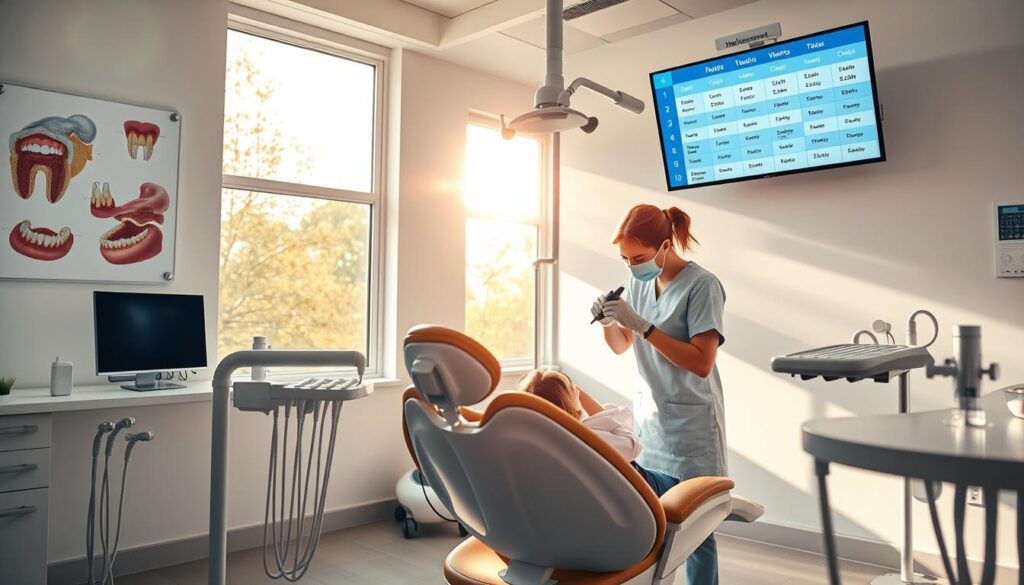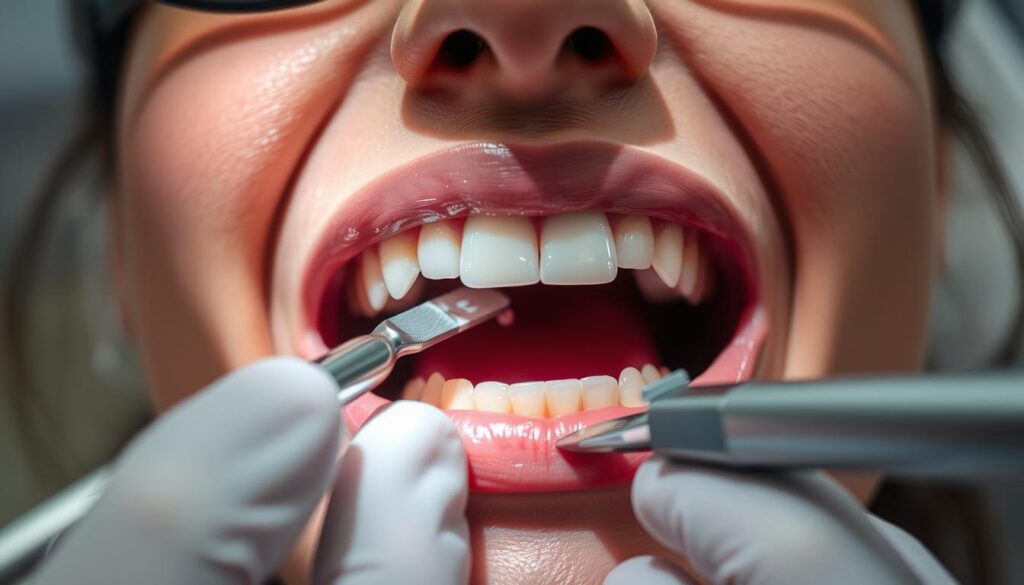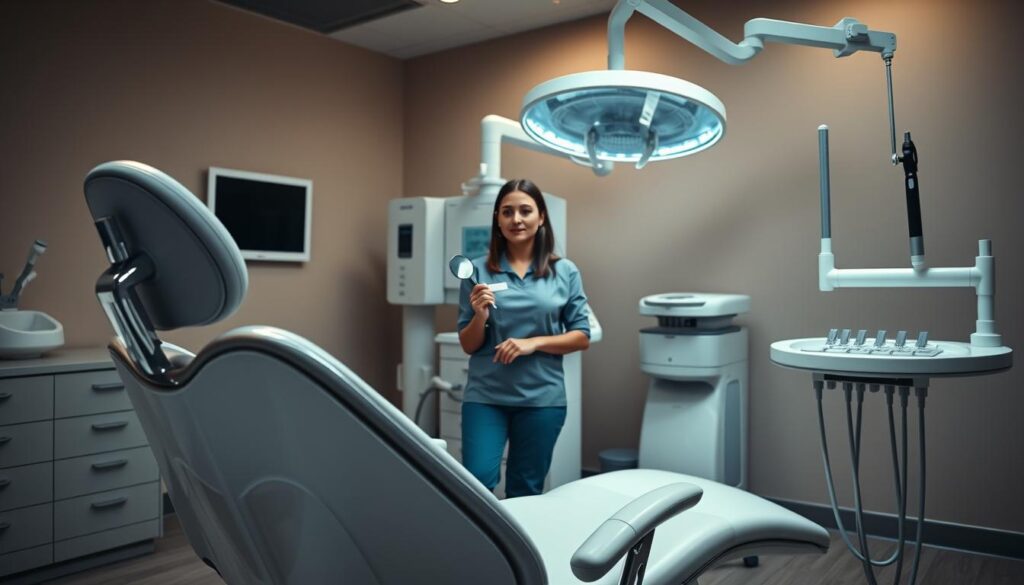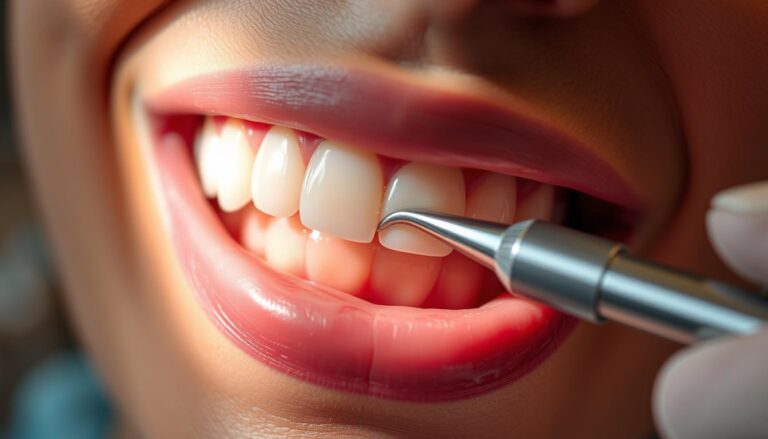Should I Get My Teeth Cleaned More Often Than Twice a Year?

Is six months enough to keep your smile shining? Or do you need to visit the dentist more often? Many wonder, “Should I get my teeth cleaned more often than twice a year?” This question is a hot topic in dental circles and beyond.
For most, twice a year is fine. But some face higher risks that might need more attention. Experts say genetics or certain health conditions could be the reason for more frequent visits.
They remind us that everyone’s oral health needs are different. By understanding these factors, you can decide if you need more frequent cleanings.
Key Takeaways
- Six-month cleanings may suit many, yet some need closer intervals.
- Certain medical conditions increase plaque formation or gum issues.
- Professional consultations pinpoint personalized cleaning schedules.
- Extra visits can prevent tartar buildup and long-term damage.
- Regular checkups detect problems before they become severe.
Understanding Dental Cleanings
Routine plaque removal helps keep your smile strong by controlling harmful bacteria. It keeps your gums healthy and prevents problems. Regular dental cleanings reach areas your toothbrush can’t.

What Is a Dental Cleaning?
Dental experts use special tools to clean your teeth. They remove plaque, tartar, and stains. This includes scaling, polishing, and flossing to get rid of hidden dirt.
Importance of Regular Cleanings
Regular cleanings cut down on bacteria that can cause gum disease or cavities. They work with your daily brushing to clean hard-to-reach spots. Studies show regular cleanings keep your mouth healthy for a long time.
Recommended Frequency for Dental Cleanings
Many people wonder how often they should get professional cleanings to keep their smile healthy. Regular cleanings help prevent plaque and improve gum health. Good oral hygiene practices at home are key to avoiding cavities and pain.
General Guidelines for Adults
Most adults are advised to visit the dentist every six months. Dentists might suggest more or less frequent visits based on your health or gum issues. They look for signs of plaque and suggest the best cleaning schedule for you.
Frequency Recommendations for Children
Children need more dental care because their teeth and gums are changing. Pediatric dentists consider growth and diet. They might see kids every two or three months if they’re at risk for cavities or don’t brush well.
Special Cases: High-Risk Patients
People with chronic conditions, gum disease, or weak immune systems might need to see the dentist more often. Dentists keep a close eye on these patients and offer specific advice. This helps maintain good oral hygiene practices and prevents more problems.
Factors Influencing Cleaning Frequency
How often you get your teeth cleaned can change based on your personal life. Things like your risk for dental problems, daily habits, and health history play a big role. While science offers guidelines, what works for one person might not work for another. Talking to your dentist can help create a cleaning plan that fits you perfectly.
Oral Health History
If you’ve had cavities or gum disease before, you might need to see your dentist more often. Catching problems early and following up can prevent bigger issues. Regular check-ups help keep an eye on your teeth and gums.
Lifestyle Choices and Habits
Some habits can harm your teeth faster. For example:
- Eating a lot of sugar
- Using tobacco or vaping
- Drinking acidic drinks often
Changing these habits can help keep your teeth clean and healthy for longer.
Current Dental Conditions
If you have orthodontic work or are getting dental treatments, you need to be extra careful. Things like braces or recent dental work can trap plaque. A dentist can create a cleaning schedule that meets your specific needs.
Signs You May Need More Frequent Cleanings
Early signs of poor oral care can be subtle. They often suggest the need for more dental visits. If you’re looking for teeth cleaning tips, watch out for these warning signs.

“The American Dental Association advises routine evaluations to catch any possible risks early.”
Regular dental visits can prevent bigger problems. Knowing these warning signs helps keep your smile bright.
Persistent Bad Breath
Bad breath that won’t go away might mean bacteria under your gums. More frequent cleanings can get rid of plaque and stop bad smells.
Gum Sensitivity and Bleeding
Bleeding gums when you brush are a sign of inflammation. Seeing a dentist more often can help manage these symptoms and prevent worse problems.
Visible Tartar Build-Up
Yellow or hard deposits on your teeth show you need more than brushing. Professional cleanings can remove plaque and keep your breath fresh.
- Excess plaque: Harbors harmful microbes
- Frequent bleeding: May escalate into gum disease
- Tartar streaks: Increase chances of tooth decay
| Sign | Possible Cause | Suggested Action |
|---|---|---|
| Odor | Bacterial Overgrowth | Seek additional professional cleaning |
| Bleed | Gum Inflammation | Consult a dentist about more frequent sessions |
| Tartar | Mineral Deposition | Adopt appropriate teeth cleaning recommendations |
Benefits of More Frequent Cleanings
Going to the dentist more often is a smart way to keep your teeth and gums healthy. In the US, many dentists suggest seeing them regularly to catch problems early. People who get their teeth cleaned more often see quick and lasting benefits.
To learn more about keeping your teeth healthy, check out dental check-ups and cleanings. They explain how regular visits help your overall health.
Enhanced Oral Health
Regular cleanings get rid of tough plaque. This makes your teeth healthier and helps your enamel grow strong. It also keeps your gums soft and reduces pain or sensitivity.
Prevention of Gum Disease
Seeing the dentist more often stops plaque from building up. This action lowers inflammation and keeps gum disease away.
Reduced Risk of Cavities
Going to the dentist often slows down bacteria growth. This can stop cavities from forming and keep your teeth natural. Choosing to get your teeth cleaned regularly keeps your smile bright all year.
Risks of Not Cleaning Enough
Waiting too long between dental cleanings can harm your oral health and overall well-being. Regular dental visits help keep your gums healthy and prevent serious damage. They also stop small problems from getting worse.

Not cleaning your teeth regularly allows bacteria and plaque to build up. This can cause gum inflammation and bone loss. It can even affect the long-term health of your teeth.
Potential for Advanced Dental Issues
Plaque turning into tartar is a breeding ground for bacteria. If not treated, it can lead to periodontal disease. This causes pain and can make your teeth move. Catching it early is key to avoiding these issues.
Teeth Staining and Sensitivity
Poor dental care can cause teeth to stain deeply. Damage to the enamel can make teeth sensitive to cold or heat. Regular cleanings help prevent these problems.
Increased Treatment Costs
Ignoring early signs can lead to more expensive treatments. Dentists may need to do more complex procedures. Regular dental visits and a good cleaning schedule can help avoid these costs.
What to Expect During a Cleaning
When you visit for a cleaning, it usually starts with a quick check of your mouth. Each step is designed to keep your teeth and gums healthy. This helps you maintain good oral health for a long time.
The Cleaning Process Explained
Special techniques are used to remove both visible and hidden plaque. The process may include:
- Scaling to remove tough plaque
- Polishing to make your teeth feel smoother
- Rinsing to get rid of any leftover bits
By cleaning every tooth, you get a more even and refreshing cleaning.
Tools and Techniques Used
Dentists often use tools recommended by the American Dental Association. Ultrasonic scalers remove hard tartar, and air-polishing systems tackle surface stains. These tools are chosen based on your specific needs to keep your teeth clean.
| Procedure Step | Purpose |
|---|---|
| Scaling | Detaches plaque and calculus |
| Polishing | Removes stains and smooths enamel |
| Fluoride Application | Reinforces tooth structure |
The Role of Dental Exams
A thorough exam checks gum health, tooth alignment, and the overall structure of your mouth. It’s a way to catch early signs of decay or infection. Dentists use visual checks and probing to find hidden problems.
Dentists also look for changes in fillings or crowns. They might find signs of systemic conditions. For more on exam steps, check out this detailed guide. This approach leads to better care and long-term oral health.
Integrating Exams with Cleanings
Combining exams and cleanings makes visits more efficient. Many patients like having one appointment for both. It ensures plaque removal and gets important diagnostic insights.
Importance of Diagnostics
Tools like X-rays and periodontal probes find changes that might not be seen easily. Early detection helps prevent bigger problems. It also helps make treatment plans more effective.
Choosing the Right Dentist
Finding a good dentist is key to a lifetime of healthy teeth and gums. It’s not just about their skills. How comfortable you feel is also important. A dentist who makes you feel at ease is essential.
Credentials to Look For
Look for a dentist with the right licenses and certifications. This shows they are qualified and keep up with the latest in dentistry. If they have specialists on staff, it’s a plus for complex cases.
These signs of expertise can make every dental visit better.
Importance of a Comfortable Office Environment
A friendly office with modern tools helps you relax. Comfortable chairs and a calm atmosphere make visits easier. Feeling at ease helps you stick to regular cleanings.
Good staff and the latest technology make your dentist visits more than just necessary. They become a chance to improve your oral health together.
Patient Education and Engagement
Learning about oral health makes you stronger and more confident. It’s about asking questions about how to keep your teeth clean. It’s also about knowing the signs of gum disease and how to avoid plaque.
Working together with your dentist makes dental visits more beneficial. They can give you cleanings that fit your needs.
Understanding Your Dental Health
Knowing more about your teeth can make you less anxious. It helps you spot problems early, like tartar or cavities. Looking into reliable sources and paying attention to tooth sensitivity can help.
Here are some ways to learn more:
- Discussing preventive tips during dental visits
- Requesting explanations for unfamiliar terms
- Reviewing the impact of nutrition on overall wellness
Communicating with Your Dentist
Talking openly with your dentist helps you stay on track. Share any symptoms you have, like bleeding or pain. This way, your dentist can create a plan just for you.
This teamwork helps fight plaque and keeps your teeth healthy for years to come.
Cost Considerations for More Frequent Cleanings
Patients often think about the cost of extra dental cleanings. They compare it to the benefits of catching problems early. Understanding the costs and possible savings helps them make smart choices about their teeth.
Going for more cleanings can prevent expensive treatments later. This is good for those with gum problems or plaque. Knowing what insurance covers and planning your budget helps keep your teeth healthy and your wallet happy.
Insurance Coverage and Options
Dental insurance plans differ in what they cover. Some allow more cleanings each year, while others stick to two a year. It’s smart to check your policy or talk to an insurance agent. You might also look into extra plans to fill gaps in coverage.
Budgeting for Dental Care
Creating a budget for dental care can ease the stress of regular cleanings. Many dentists offer payment plans to make costs more manageable. Health savings accounts can also help by saving you money on taxes. Your choice of coverage and how you pay depends on your needs and what you value most.
| Payment Method | Main Advantage |
|---|---|
| Insurance Plan | Potential coverage for added sessions |
| HSA or FSA | Pre-tax funds for dental expenses |
| Installment Plans | Spreads costs over multiple months |
Alternative Oral Hygiene Practices
Some people try different ways to keep their mouths clean and fight plaque. They use daily home care and special cleanings from dentists. This combo is great for fighting cavities and gum disease.
Importance of At-Home Care
Brushing and flossing clean the surface of your teeth. But, some spots are hard to reach. Are you getting to the areas under the gum line where bad bacteria hide? A good routine helps prevent tartar and gum disease.
- Brush for two minutes with fluoride toothpaste
- Floss carefully to remove hidden debris
- Rinse with mouthwash designed to reduce bacteria
Role of Professional Cleanings
Dentists use special tools to clean areas you can’t reach at home. They do gentle scaling and polishing. This makes sure your teeth are really clean and helps prevent gum problems. Professional cleanings are key to keeping your teeth healthy.
Expert Opinions on Cleaning Frequency
Many dentists think the six-month cleaning schedule is a good starting point. They suggest that people with certain health issues might need more frequent cleanings. Factors like smoking or genetics can affect how often someone should get their teeth cleaned.
Regular cleanings and check-ups are key to good oral health. There’s a debate about whether everyone should follow the same cleaning schedule. This depends on personal habits and other factors.
Perspectives from Dental Professionals
Dentists look at gum health, immune system, and lifestyle when planning cleanings. They consider a patient’s past dental care to make the best plan. This helps prevent future problems.
Studies and Research Findings
Research shows a more complex picture. Older studies found little benefit from cleanings more than every six months. But newer research suggests frequent visits can help some people avoid gum disease. It’s clear that one cleaning schedule doesn’t fit everyone.
| Study | Focus | Key Insight |
|---|---|---|
| Lin et al. | Risk-based intervals | Improved results in high-risk groups |
| Smith et al. | General population | Stable outcomes for healthy patients |
Conclusion: Finding Your Ideal Cleaning Schedule
Everyone’s needs are different when it comes to cleaning teeth. Your history is unique and needs careful thought. Brushing and flossing daily is key, but deeper cleanings offer extra protection.
Getting advice from a dentist is important. They look at your past, smoking habits, and health. Some might need to go more often, while others can stick to twice a year.
Regular dental visits help catch problems early. They make your cleaning routine stronger. Each visit brings new insights and tips to keep your mouth healthy.
Combining home care with dental visits is the best plan. It fights cavities and keeps your smile shining. Talking with your dentist builds trust and ensures your mouth stays healthy for life.


